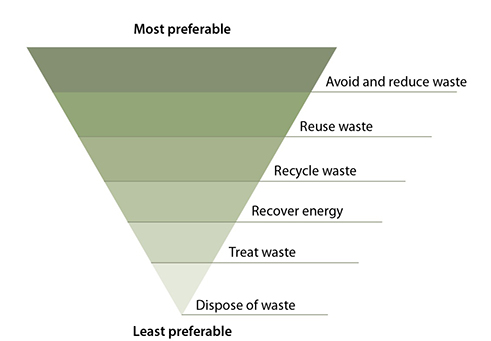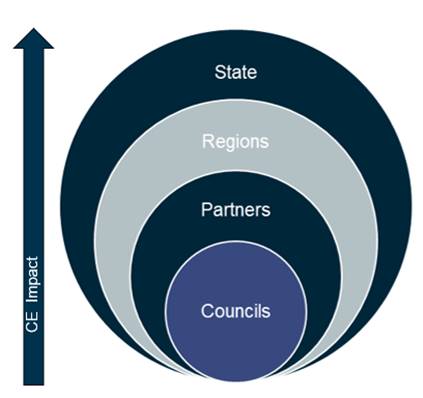Circular economy
Circular economy is about changing the way we produce, assemble, sell and use products to minimise waste, and to reduce our environmental impact.
The circular economy can also be great for business; by maximising the use of our valuable resources, and by contributing to innovation, growth and job creation.
The NSW EPA’s work to drive a circular economy (CE) is underpinned by the NSW Waste and Sustainable Materials Strategy (WaSM) 2041 and the Circular Economy Policy.
The WaSM is supported with $356 million funding and sets out the first stage of a 20-year vision to reduce waste, increase recycling and transition the state to a circular economy through:
- Meeting our future waste infrastructure and service needs by stimulating investment and innovation.
- Reducing carbon emissions through better waste and materials management by decreasing reliance on emissions-intensive virgin materials and increasing recycling and remanufacturing.
- Building on our work to protect the environment and human health from waste pollution by preventing littering, illegal dumping, and the mismanagement of hazardous wastes.
We can create a circular economy by embedding Circular Economy principles in all we do, including supporting reuse or repair for products before they are thrown out, procuring recycled content and recycling material so it can be used multiple times in manufacturing or building.

Working together to progress a circular economy
-
The NSW EPA recognises that the transition to a Circular Economy requires multi-disciplinary relationships.
-
Local government is well placed to influence their communities in Circular Economy thinking and practice.
-
By establishing a Circular Economy strategy, councils set the direction for their community and affect change in their LGA through their delivery programs.
-
Moving to a Circular Economy opens exciting opportunities for each region to strengthen their local economies, develop new markets, attract investment, and create jobs - supporting their communities and protecting their environments into the future.
-
By working together, through knowledge sharing, mentoring, and collaboration, there is greater chance of creating a Circular Economy at a regional level and long-term circular outcomes across the state.

Circular economy initiatives underway
1. Circular Economy Accelerator for councils
The NSW EPA Circular Economy Accelerator Pilot for councils is delivered in partnership with Circular Australia. It aims to build capabilities in local government to embed circular economy thinking and develop circular economy projects. Fifty-eight council staff participated in the Pilot, and all have reported an increase in their circular economy maturity.
The Circular Economy Accelerator included:
- collaborative workshops with local government and experts in behaviour change and project design to brainstorm reuse and repair projects that support higher order outcomes for our waste streams
- a focus on CE Hubs and precincts as these present an exciting opportunity for citizens and communities to drive the transition to a zero-waste and zero-carbon future
- creating a slew of resources that can be shared and accessed by councils
- establishing a CE Network in partnership with LGNSW to allow for sharing of knowledge and resources.
2. Support for regional councils
The NSW EPA has partnered with DCCEEW’s Sustainable Councils Team on regional council programs to accelerate a circular economy, reduce emissions and deliver on the net zero targets as synergies exist within each agency’s respective programs.
3. NSW EPA Grants under WaSM
The Local Government Waste Solutions program supports councils in the waste levy area to transition to a circular economy by supporting innovative waste and recycling solutions designed to achieve impactful, long-term outcomes.
GO FOGO grants support councils to roll out food organics and garden organics (FOGO) recycling collections to households. Additional support for business food waste recycling, food rescue and avoidance is also available through the Net Zero Organics program.
The NSW EPA leads a Regional Coordination Support Program (2022 to 2027) which aims to support collaboration for voluntary regional waste groups (including regional organisations of councils and joint organisations) to progress their waste targets and the transition to a circular economy. The funds include $15.6 million under WaSM over 5 years. The program funds 14 regional waste coordinators that represent 127 councils in NSW.

